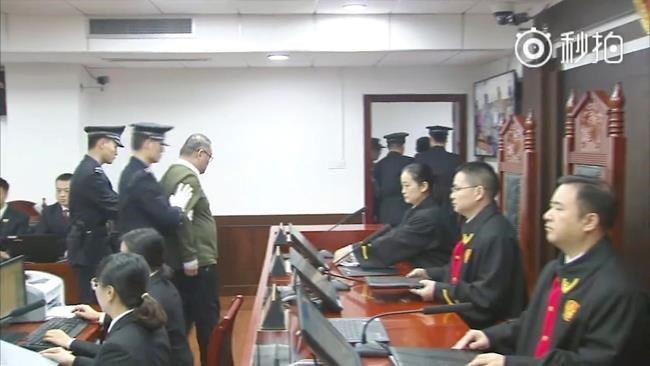
In this image taken from video released on Nov. 28, 2017 by the Intermediate People's Court of Yueyang, Taiwanese activist Lee Ming-che is escorted out after a court session at the Intermediate People's Court of Yueyang in Yueyang in central China's Hunan Province, Tuesday, Nov. 28, 2017. China sentenced Lee to five years along with his co-defendant Peng Yuhua, from mainland China, to seven years in prison Tuesday for holding online political lectures and helping the families of jailed dissidents in a conviction demonstrating how Beijing's harshest crackdown on human rights in decades has extended beyond the Chinese mainland. (Intermediate People's Court of Yueyang via AP Video)
Republished November 28, 2017 - 7:15 AM
Original Publication Date November 27, 2017 - 6:51 PM
BEIJING - China sentenced a Taiwanese activist to five years in prison Tuesday for holding online political lectures and helping the families of jailed dissidents in a conviction demonstrating how Beijing's harshest crackdown on human rights in decades has extended beyond the Chinese mainland.
The trial of Lee Ming-che was also China's first known criminal prosecution of a non-profit group worker since Beijing passed a law last year tightening controls over foreign nongovernmental organizations.
The Yueyang City Intermediate People's Court in central China handed down the sentence against Lee after finding him guilty of subversion of state power. Lee had confessed during his trial in September, which his wife, Lee Ching-yu, dismissed as "a political show."
Lee's co-defendant, Peng Yuhua, who is from mainland China, was sentenced to seven years in prison. Peng had also pleaded guilty, saying he had founded an organization called Palm Flower Co. to pressure China to accept a multiparty political system and that Lee was his deputy in charge of education.
Lee's wife attended the sentencing. "A price must be paid in the pursuit of an ideal," she said in a statement issued through her supporters. "Striving for human rights for the underprivileged is a necessary dedication to promoting the progress of human civilization."
Supporters say that since the trial ended, Lee Ching-yu has been prevented from leaving her hotel room or meeting with anyone. Calls to her cellphone rang unanswered.
"Lee Ming-che took the risk despite knowing the dangers," she said, adding that she was proud of him.
Subversion of state power is a vaguely defined charge often used by Chinese authorities to muzzle dissent and imprison critics. Both men said they would not appeal.
Taiwan, a self-governing island Beijing regards as part of Chinese territory, swiftly condemned the sentence.
"The spread of democratic ideas is innocent!" Alex Huang, the spokesman for Taiwanese President Tsai Ing-wen, said in a statement. Huang urged Beijing to release Lee as soon as possible and allow him to return to Taiwan.
"We cannot accept that Lee Ming-che has been convicted of 'state subversion' for sharing ideas of freedom and democracy out of concern for the development of mainland China's civil society and democracy," the statement said.
Taiwan's Cabinet-level Mainland Affairs Council said in a statement that it would not accept the verdict and that the government would continue working to secure Lee's release from China.
Lee Ming-che, 42, cleared immigration in the semi-autonomous Chinese territory of Macau on March 19 and never showed up for a planned meeting later that day with a friend in the mainland Chinese city of Zhuhai.
He had previously conducted online lectures on Taiwan's democratization and managed a fund for families of political prisoners in China.
Lee's sentence was "incredibly harsh," given the accusations against him and the lack of evidence, said Maya Wang, Human Rights Watch's Hong Kong-based researcher.
"It's probably designed as a warning to activists based outside China, particularly those in Hong Kong and Taiwan," as Chinese President Xi Jinping's crackdown on dissent radiates beyond its borders, Wang said in an email.
In Taiwan, Lee's sentence was met with condemnation and worries about China's cross-border reach.
"This tells all Taiwanese people that this is China's threat. This is also a threat from China to all NGO workers in the world," said Cheng Hsiu-chuan, principal of Taipei Wenshan Community College, where Lee worked as an administrator.
"China is warning us that even if you are not within Chinese territory, it can incriminate you if you go to China," Cheng said.
Lisa Lin, a 20-year-old university student, said the case displays the contrast between China's repressive system and Taiwan's democratic freedoms.
"I think this is not very good because everyone should have the right to express their opinions," Lin said.
China's wide-ranging crackdown on civil society has featured a string of televised "confessions" — believed to have been coerced — from human rights activists accused of plotting to overthrow the political system.
The new law passed in April 2016 says foreign nongovernmental organizations must not endanger China's national security and ethnic unity, and places non-profit groups under close police supervision. It is seen as an attempt to clamp down on perceived threats to the ruling Communist Party's control.
Relations between Taiwan and China have been near an all-time low since the election of Tsai, whose party has advocated Taiwan's formal independence. China cut off contacts with Taiwan's government in June of last year, five months after Tsai was elected.
___
Associated Press video journalist Johnson Lai contributed to this story from Taipei, Taiwan.
News from © The Associated Press, 2017